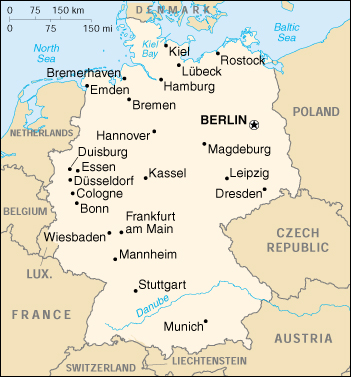
Contact Information
Name: Dr. Marjorie D. Wade - Faculty Web Page - Foreign Languages Department
Title: Professor of German
Office Location: MRP 2021
Email: mdwade@csus.edu
Office Phone: (916) 278-5508 (no voicemail)
Mailing Address: Sacramento State University 6000 J Street Sacramento, CA 95819-6043
Office Hours: Spring 2016: MW 5:00-5:30 pm WFr 11:00-11:50 am
This page updated: : February 1, 2016
Courses that I teach
Spring 2016:
German 1B Syllabus
German 5A/105 Syllabus
German 140 Syllabus
German 151 Syllabus
STUDY GUIDES FOR GERM 151:
Materials for Test #1:
Handout House of Hapsburg
Materials for Test #2:
Handout Prussia (ch9)
Handout Baroque (ch10)
Handout Dualism (ch11)
Handout Eighteenth Century
Materials for Test #3:
Materials for Test #4:
Materials for Test #5:
Handout Origins of National Socialism (ch23)
Handout The Third Reich

********************************************************************
Previous Courses
Fall 2015:
German 1A Syllabus
German 2A/2B Syllabus
German 150 Syllabus
Spring 2015:
German 1B Syllabus
German 5A-105 Syllabus
German 141 Syllabus
German 151 Syllabus
Fall 2014:
Fall 2013:
Audun and the Polar Bear Reading
Spring 2013:
Fall 2012:
Fall 2011:
- Germ 1A Syllabus
- Germ 100 Syllabus - Grammar Review Germ 100 - Grammar Links Germ 100
- Germ 143 Syllabus
- Germ 150 Syllabus
Spring 2011:
- Germ 1B Syllabus
- Germ 5A/105 Syllabus - Grammar Links Germ 5
- Germ 140 Syllabus
- Germ 151 Syllabus
Also Germ 2A / 2B
STUDY GUIDES FOR GERM 151:
Materials for Test #1:
Handout House of Hapsburg
Materials for Test #2:
Handout Prussia (ch9)
Handout Baroque (ch10)
Handout Dualism (ch11)
Handout Eighteenth Century
Materials for Test #3:
Materials for Test #4:
Materials for Test #5:
Handout Origins of National Socialism (ch23)
Handout The Third Reich
********************************************************************
Courses taught in English
The following courses taught by Professor Wade are taught entirely in English. They meet the current requirements for General Education. Scroll down to see Course Descriptions below or click on the Course Name/Number.
German 140 -- HEROES, DRAGONS AND QUESTS (3 units) Flyer
German 141 -- GERMANIC MYTHOLOGY AND LEGEND (3 units)
German 142 -- GERMAN FOLK LITERATURE, LEGEND AND LORE (3 units) Flyer
German 143 -- KING ARTHUR AND THE KNIGHTS OF THE ROUND TABLE IN GERMANY (3 units) Flyer
German 150 -- GERMAN CIVILIZATION: BEGINNINGS THROUGH THE REFORMATION (3 units)
German 151-- GERMAN CIVILIZATION: SEVENTEENTH CENTURY TO PRESENT (3 units)
********************************************************************
German 5 / 105 -- GERMAN LANGUAGE PRACTICE (3 units)
German 5 - Practice with German conversation and vocabulary; supervised individual and small-group instruction designed to develop German vocabulary, including conversation and listening skills at an intermediate level. Note: Meets the Foreign Language Graduation Proficiency Requirement. May be taken for credit four times.
German 105 - Advanced German Language Practice. Supervised individual and small-group practice for upper-division students desiring to improve their German language skills, especially conversation, listening and vocabulary. Some written work may be assigned. May be taken for credit three times, but may count only once for major or minor credit.
German 140 -- HEROES, DRAGONS AND QUESTS (3 units)
Exploration of the heroic adventures of the medieval knights in their quests for fame and love, with special attention to the bridal quest and the roles of their ladies, their social, political and economic position, and their impact on life in the Middle Ages. Discussions will be based on the reading of selected Middle High German works in English translation.
Prerequisites: There is no German language requirement for this class. All lectures, class discussions and readings are in English.
This course fulfills the General Education Requirement for category C4.
German 141 -- GERMANIC MYTHOLOGY AND LEGEND (3 units)
An exploration of Germanic myth and legend and their impact on Western art and literature. The Germanic peoples depiction of the creation of the world and its destruction.
Prerequisites: There is no German language requirement for this class. All lectures, class discussions and readings are in English.
This course fulfills the General Education Requirement for category C4.
German 142 -- GERMAN FOLK LITERATURE, LEGEND AND LORE (3 units)
Through the study of the folk literature, traditions, and customs of the German-speaking world we can gain a better understanding of the traditional culture which has contributed so richly to our own society. Readings from the Fairy Tale collections of the Brothers Grimm and the Germanic heroic legends will provide the basis for our study of folk tales. Attention will be given to the study of the German calendar year—holiday customs, rites of passage, national festivals—and how these festivals have contributed to our own holiday practices. An overview of the geography and history of Germany, Austria and Switzerland will provide the background to the study of the traditional material culture of the German-speaking world: national dress, folk art, folk dance, folk music and instruments. Prerequisites: There is no German language requirement for this class. All lectures, class discussions and readings are in English.
This course fulfills the General Education Requirement for category C4.
German 143 -- KING ARTHUR AND THE KNIGHTS OF THE ROUND TABLE IN GERMANY (3 units)
A study of King Arthur and the knights of the Round Table in the German medieval romances. In our reading and discussion of the epics we will examine the underlying values and ideals which have had significant impact on the morals and customs of Western Civilization. No prerequisites. There is no German language requirement for this class. All lectures, class discussions and readings are in English.
This course fulfills the General Education Requirement for category C4.
German 150 -- GERMAN CIVILIZATION: From the Great Migrations through the Age of the Reformation. (3 units)
Course Description. A history of German culture from its beginnings through the sixteenth century, this course surveys the historical, social and artistic forces in German civilization.
At the geographic heart of Europe, the Germanic peoples have played a central role in European civilization since Carolingian times and have had a major influence on world history and world thought. This course provides an overview of the Great Migrations, the Gothic invasions of the Roman Empire, feudal culture under Charlemagne and his successors, the Crusades and the knightly culture of the Hohenstaufen princes, and the Age of Martin Luther and the Reformation. German 150 provides a foundation for study in depth of the literature, life and culture of the German-speaking countries and is intended to help the student develop an appreciation and knowledge of the contributions of the German-speaking world to Western civilization.
Students interested in History, Political Science, Philosophy, Journalism, Art History and Music should find this course useful.
Prerequisites: There is no German language requirement for this class. All lectures, class discussions and readings are in English.
Fulfills the General Education Requirement for category C1.
German 151 -- GERMAN CIVILIZATION: SEVENTEENTH CENTURY TO PRESENT (3 units)
The historical, social and artistic forces in German civilization from the Seventeenth century to the present. The German-speaking countries, geographically at the very heart of Europe, have played a central role in European civilization since Carolingian times and have had a major influence on world history and world thought. This course is designed to provide a background of the political and cultural history of the German-speaking world and presents an overview of the geography, political, social and intellectual history with attention to the major trends in art and music This course provides a foundation for study in depth of the literature, life and culture of the German-speaking and is intended to help the student develop an appreciation and knowledge of the contributions of the German-speaking world to Western civilization.
All reading and lectures in English. (3 units)
This course fulfills the General Education Requirement for Category C1.
********************************************************************
GERMAN PROGRAM
Courses in German encompass the study of German language, literature, and culture. Language study begins with the imparting of the four basic language skills: speaking, aural comprehension, reading, and writing. The imparting of the basic language skills is the first and necessary step toward what is actually the liberal arts core of our curriculum: the upper division offerings.
It is through the advanced language courses as well as through the literature and culture courses that the students become familiar with the intricacies of another language, begin thinking in that language, and become familiar with the literary and cultural contributions made by the people speaking it.
Each student minoring in German is assigned an advisor upon entry into the program. Teaching credential candidates must complete the Professional Education Program in addition to other requirements for a teaching credential.
Interested in GE classes in English? We offer several GE courses about German history, culture and literature taught exclusively in English.
The minor in German requires 12 upper division units. Students are required to meet with a minor advisor for course selection.
German 1A Beginning German (4 units)
German 1B Beginning German (4 units)
German 2A Intermediate German (4 units)
German 2B Intermediate German (4 units)
German 5 / 105 -German Language Practice (3 units)
German 100 Advanced Grammar (3 units)
German 110 Survey of German Literature to Classicism
German 112 Modern German Literature
German 194 Field Experience/Internship
German 195 Fieldwork: Tutoring
German 199 Special Problems
The following courses taught by Professor Wade are taught entirely in English. They meet the current requirements for General Education.
German 140 -- HEROES, DRAGONS AND QUESTS (3 units)
German 141 -- GERMANIC MYTHOLOGY AND LEGEND (3 units)
German 142 -- GERMAN FOLK LITERATURE, LEGEND AND LORE (3 units)
German 143 -- KING ARTHUR AND THE KNIGHTS OF THE ROUND TABLE IN GERMANY (3 units)
German 150 -- GERMAN CIVILIZATION: BEGINNINGS THROUGH THE REFORMATION (3 units )
German 151-- GERMAN CIVILIZATION: SEVENTEENTH CENTURY TO PRESENT (3 units)
********************************************************************
WHY STUDY GERMAN?

The reasons for studying German are as diverse as the students who actually do so. German is sopken in three countries with widely diverse cultural, political and economic traditions: the Federal Republic of Germany, Austria and Switzerland.As a language of business, diplomacy, and tourism in Western Europe, it stands second only to English. Much of the language’s current importance stems from the Federal Republic’s economic status. Economically the most important member of the European Union, it has the third-highest GNP in the world, is the second highest creditor nation, and every year occupies one of the top three spots among exporting countries. There is the challenge and pleasure of mastering the German language. There opens up to the student of German a fascinating literary tradition. In becoming acquainted with a culture that is central to the history, economy, and civilization of the West, many students will simultaneously be deepening their knowledge of their own heritage. As a student of German one develops skills in critical analysis as well as spoken and written communication that will prepares one for a wide range of graduate studies and careers.
The study of German is a classic “liberal arts” major, comparable to the study of such subjects as English, Philosophy, or Sociology. While pursuing a Bachelor’s degree in German does not lead directly into a specific career track in the way that studying, for example, Engineering, Nursing, or Accounting might, it does stimulate both creative thinking and a contrastive outlook on American life. Experience abroad is regarded as a plus by many potential employers, who fully expect to provide specialized training to their new employees and are therefore primarily interested in your adaptability and overall intellectual organizational, and communicative abilities.
For graduate work and careers in the natural and social sciences, as well as in linguistics, comparative literature, history, art history, and music, facility with German is a decided advantage. With a BA in German you will be prepared for a number of different careers—a liberal arts background, especially in German, is a very strong plus in such diverse fields as communications, foreign trade, international banking, the tourist industry, libraries, archives, the book trade, film studies and/or film production.
German majors can successfully go on to careers in such diverse fields as law, computing, travel, journalism, theater, health professions, international business, high school or university teaching, the ministry, the military, and government service.
Click on these links for additional discussions of "Why study German?"
Why study German by Prof. Goulding, CSU Chico
Why study German? Goethe Institut
********************************************************************
One of the most effective ways for students to immerse themselves in another culture is to study or work there. German students can be successfully placed in a variety of academic study and employment positions overseas. For further information on study abroad programs, please check the CSUS Global Education web site or call the Office of Global Education at 278-6686 or go to Lassen Hall, Room 2304. For more information about traveling and studying in Germany please email Dr. Wade.
Study Abroad
International Programs administers a variety of study programs abroad at many universities in Germany: Heidelberg, Tübingen, Flensburg. For more information visit the International Program'sweb site or email Janis Silver
Work Abroad
Many of our German students have spent 8 to 12 weeks abroad in Germany, Switzerland or Belgium working through the International Cooperative Educational Program, for companies such as BMW, Mercedes-Benz, Porsche, in banks, hotels, restaurants, etc... THese internships provide not only real job experience, language practice, contacts, and not least of all an impressive addition to resumes that often opens the door to future job opportunities. Interns enjoy maximum contact with native speakers, abundant opportunity to practice the language, learn new skills and put the skills that they have learned in the classroom to practical use. At least one year of German is required to be eligible for these paid internships, for which students may also receive academic credit.
For more information visit the International Cooperative Educational Program's web site.
Exchange Programs
The CSUS German Program has a one to one exchange program with the Johannes Gutenberg Universität, Mainz for graduate study that is funded with a scholarship.
The Johannes Gutenberg University in Mainz, the capital of the Rhineland-Palatinate, has 30,000 students and twenty-six departments. Each department offers about 200 courses per semester, so a broad variety of lectures, proseminars and seminars are available for our students.
For one CSUS graduate student, a stipend is offered by Johannes Gutenberg University in the approximate amount of DM 800 per month. Applicants should have classified graduate standing at CSUS by the time of application, good academic records with a minimum 3.0 grade point average, three years of college level German or the equivalent, and be prepared to accept the challenge of study in a country with an educational system different from our own.
Scholarships
For one CSUS graduate student, a stipend is offered by Johannes Gutenberg University in the approximate amount of DM 800 per month. Applicants should have classified graduate standing at CSUS by the time of application, good academic records with a minimum 3.0 grade point average, three years of college level German or the equivalent, and be prepared to accept the challenge of study in a country with an educational system different from our own.
There is also a stipend available to one CSUS student at the University of Flensburg. Flensburg is Germany's most northerly port and the most important town in Schleswig. There are some 250 courses at the University of Flensburg open to CSUS students. See the website http://www.uni-flensburg.de/ for detailed information on the courses offered. The student receiving the stipend is expected to live in the dormitory. The cost of the dormitory room (around DM 350 per month) is automatically deducted from the stipend. In addition, health insurance, which is mandatory, is also deducted from the stipend and costs around DM 95 per month. This leaves approximately DM 400 living expenses per month, which is sufficient if one lives frugally.
Applicants for the Flensburg program should have upper division standing with a declared major or classified graduate standing at CSUS by the time of participation, good academic records, a minimum of three years of college level German or the equivalent, a minimum 2.75 grade point average for undergraduates and 3.0 for graduates.
Useful links

Burg Eltz

Hochosterwitz